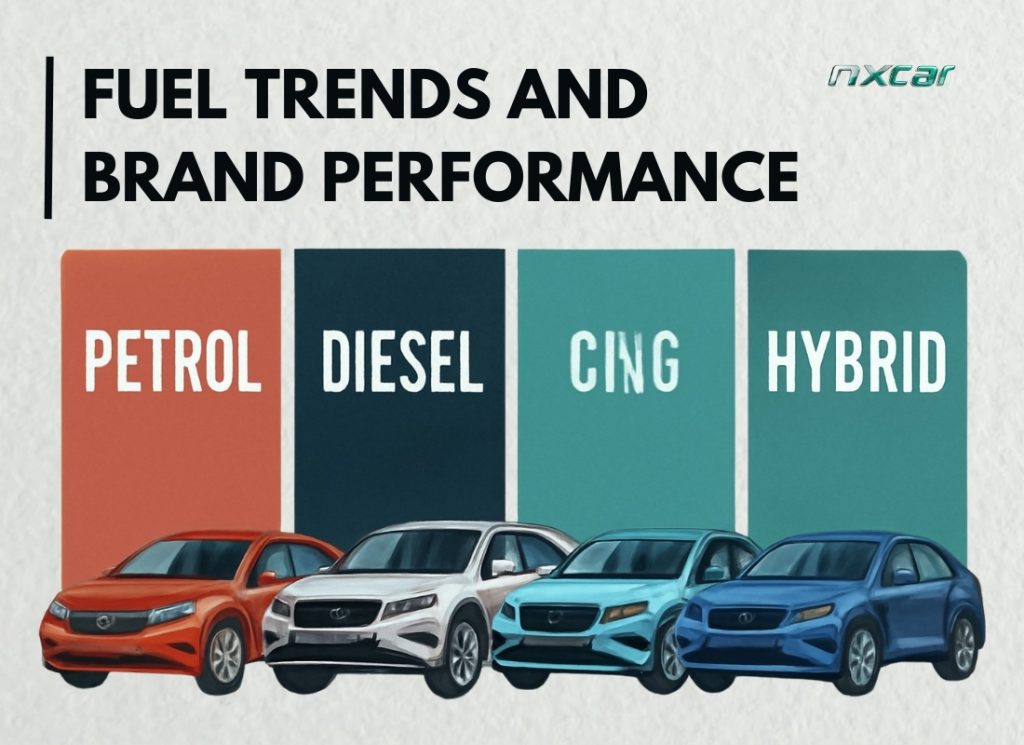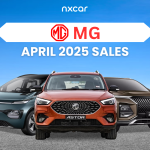The automotive landscape in India is evolving, and the fuel preferences in FY25 reflect significant trends in consumer behavior. The Indian market, traditionally dominated by petrol and diesel, is increasingly seeing a rise in the adoption of CNG, electric, and hybrid vehicles. This change is driven by several factors, including environmental concerns, government policies, and shifting consumer preferences. This report delves into the brand-wise performance, fuel type trends, and top-selling models by fuel type, providing a comprehensive view of the Indian automotive market for FY25.
Fuel Type Breakdown: Which Fuel Is Dominating?
Understanding the fuel preference is crucial for gauging the future direction of the automotive industry in India. Here’s a look at how the different fuel types have fared in FY25:
Market Share by Fuel Type in FY25
| Fuel Type | Market Share (%) |
|---|---|
| Petrol | 57.50% |
| Diesel | 18.00% |
| CNG | 19.40% |
| Electric | 2.70% |
| Hybrid | 2.40% |
The petrol segment continues to be the most significant, accounting for more than half of all vehicle sales. Diesel, while holding a smaller share, remains the dominant choice for larger vehicles, especially SUVs. The CNG market, which benefits from government incentives and growing eco-consciousness, is seeing a steady rise. However, electric and hybrid vehicles still make up a small but growing segment of the market.
Key Trends by Fuel Type
-
Petrol remains the most popular choice among Indian car buyers, especially for smaller cars and family vehicles.
-
Diesel still holds a strong position, particularly in the SUV and utility vehicle categories, where power and performance are crucial.
-
CNG is steadily gaining popularity, especially in cities, thanks to lower operating costs and the government’s push for cleaner fuels.
-
Electric and hybrid vehicles represent a niche market but are growing steadily due to evolving government policies, environmental concerns, and an increasing range of available models.
Brand-Wise Performance: Who’s Leading the Charge?
India’s automotive giants are shifting towards more fuel-efficient and environmentally friendly vehicles, but each brand has its own strengths in different fuel categories. Let’s take a detailed look at how major Original Equipment Manufacturers (OEMs) are performing across the fuel spectrum.
OEM Fuel Share Breakdown
| Brand | Petrol (%) | Diesel (%) | CNG (%) | Electric (%) | Hybrid (%) |
|---|---|---|---|---|---|
| Maruti Suzuki | 65.20% | 0.00% | 33.60% | 0.00% | 1.20% |
| Hyundai | 68.20% | 17.90% | 13.20% | 0.70% | 0.00% |
| Tata Motors | 50.60% | 13.10% | 25.20% | 11.10% | 0.00% |
| Mahindra | 20.50% | 77.10% | 0.00% | 2.30% | 0.00% |
| Kia | 66.60% | 33.10% | 0.00% | 0.30% | 0.00% |
| Honda | 98.10% | 0.00% | 0.00% | 0.00% | 1.90% |
| MG | 33.20% | 7.90% | 0.00% | 58.80% | 0.00% |
| Skoda | 100.00% | 0.00% | 0.00% | 0.00% | 0.00% |
| VW | 100.00% | 0.00% | 0.00% | 0.00% | 0.00% |
| Renault | 100.00% | 0.00% | 0.00% | 0.00% | 0.00% |
| Nissan | 100.00% | 0.00% | 0.00% | 0.00% | 0.00% |
| Citroen | 99.90% | 0.10% | 0.00% | 0.00% | 0.00% |
| Jeep | 0.00% | 100.00% | 0.00% | 0.00% | 0.00% |
Key Observations:
-
Maruti Suzuki leads in petrol and CNG, with a significant share of the CNG market in particular, thanks to their wide range of CNG vehicles like the Ertiga, Wagon R, and Dzire.
-
Hyundai performs strongly in petrol and diesel, with models like the Creta, Venue, and Grand i10 dominating the market.
-
Tata Motors has a more balanced presence, doing well in petrol, diesel, and CNG vehicles. Their electric presence is also growing with the Nexon EV.
-
Mahindra continues to dominate the diesel segment, especially with models like the Scorpio, Bolero, and XUV 700.
Top Models by Fuel Type: India’s Most Popular Cars in FY25
Top CNG Vehicles in India
| Rank | Model | CNG Sales (Units) |
|---|---|---|
| 1 | Ertiga | 1,29,920 |
| 2 | Wagon R | 1,02,128 |
| 3 | Dzire | 89,015 |
| 4 | Punch | 71,113 |
| 5 | Vitara Brezza | 70,928 |
| 6 | Eeco | 59,520 |
| 7 | Xcent/Aura | 49,464 |
| 8 | Fronx | 42,051 |
| 9 | Nexon | 34,712 |
| 10 | Baleno | 24,220 |
Key Points:
-
Maruti Suzuki dominates the CNG market with the Ertiga, Wagon R, and Dzire leading the pack. The Punch and Vitara Brezza show the increasing adoption of CNG in compact SUVs.
-
The Nexon from Tata stands out as one of the best-selling CNG vehicles in the country.
Top Hybrid Vehicles
| Rank | Model | Hybrid Sales (Units) |
|---|---|---|
| 1 | Innova HyCross | 53,005 |
| 2 | Hyryder | 26,834 |
| 3 | Grand Vitara | 16,636 |
| 4 | Invicto | 4,036 |
| 5 | Camry | 1,854 |
Key Points:
-
Toyota continues to lead the hybrid market with the Innova HyCross and Hyryder, both performing exceptionally well in the MPV and SUV segments.
-
Grand Vitara and Invicto from Maruti Suzuki also show the growing interest in hybrid vehicles.
Top Electric Vehicles (EVs)
| Rank | Model | Electric Sales (Units) |
|---|---|---|
| 1 | Windsor | 19,394 |
| 2 | Punch | 17,966 |
| 3 | Tiago | 17,145 |
| 4 | Nexon | 13,978 |
| 5 | Comet | 10,149 |
| 6 | Curvv | 7,534 |
| 7 | ZS EV | 7,042 |
| 8 | XEV 9e | 5,422 |
| 9 | XUV 400 | 4,843 |
| 10 | Tigor | 4,820 |
Key Points:
-
Tata Motors leads the electric vehicle segment, with the Windsor, Punch EV, and Tiago EV dominating the market.
-
New entrants like the Comet and Curvv are pushing the boundaries of affordability and innovation in the EV sector.
Top Diesel Vehicles
| Rank | Model | Diesel Sales (Units) |
|---|---|---|
| 1 | Mahindra Scorpio | 1,53,395 |
| 2 | Mahindra Bolero | 94,750 |
| 3 | Hyundai Creta | 77,295 |
| 4 | Mahindra XUV 700 | 70,172 |
| 5 | Mahindra Thar | 43,009 |
| 6 | Mahindra Thar ROXX | 32,410 |
| 7 | Toyota Fortuner | 31,719 |
| 8 | Kia Seltos | 29,781 |
| 9 | Kia Carens | 25,951 |
| 10 | Tata Nexon | 23,882 |
Key Points:
-
Mahindra continues to dominate the diesel segment with the Scorpio, Bolero, and XUV 700 leading the charge. Diesel remains the fuel of choice for customers seeking power and durability in larger vehicles.
-
Hyundai and Kia maintain a strong presence in diesel with the Creta and Seltos.
| RANK | OEM | Petrol | Diesel | CNG | Electric | Hybrid | FY2025 |
| 1 | Maruti Suzuki | 11,48,363 | 0 | 5,91,730 | 0 | 20,672 | 17,60,765 |
| 2 | Hyundai | 4,08,242 | 1,07,187 | 79,267 | 3,970 | 0 | 5,98,666 |
| 3 | Tata | 2,80,355 | 72,333 | 1,39,460 | 61,443 | 0 | 5,53,591 |
| 4 | Mahindra | 1,13,268 | 4,25,329 | 0 | 12,890 | 0 | 5,51,487 |
| 5 | Toyota | 1,19,415 | 79,156 | 28,089 | 0 | 82,848 | 3,09,508 |
| 6 | Kia | 1,69,976 | 84,403 | 0 | 828 | 0 | 2,55,207 |
| 7 | Honda | 64,645 | 0 | 0 | 0 | 1,280 | 65,925 |
| 8 | MG | 20,647 | 4,935 | 0 | 36,585 | 0 | 62,167 |
| 9 | Skoda | 44,862 | 0 | 0 | 0 | 0 | 44,862 |
| 10 | VW | 42,230 | 0 | 0 | 0 | 0 | 42,230 |
| 11 | Renault | 37,900 | 0 | 0 | 0 | 0 | 37,900 |
| 12 | Nissan | 27,921 | 0 | 0 | 0 | 0 | 27,921 |
| 13 | Citroen | 6,507 | 9 | 0 | 0 | 0 | 6,516 |
| 14 | Jeep | 0 | 3,951 | 0 | 0 | 0 | 3,951 |
| TOTAL | 24,84,331 | 7,77,303 | 8,38,546 | 1,15,716 | 1,04,800 | 43,20,696 |
The Decline of Diesel: A Shifting Landscape in India’s Automotive Market
| RANK | OEM | Petrol | Diesel | CNG | Electric | Hybrid |
| 1 | Maruti Suzuki | 65.20% | 0.00% | 33.60% | 0.00% | 1.20% |
| 2 | Hyundai | 68.20% | 17.90% | 13.20% | 0.70% | 0.00% |
| 3 | Tata | 50.60% | 13.10% | 25.20% | 11.10% | 0.00% |
| 4 | Mahindra | 20.50% | 77.10% | 0.00% | 2.30% | 0.00% |
| 5 | Toyota | 38.60% | 25.60% | 9.10% | 0.00% | 26.80% |
| 6 | Kia | 66.60% | 33.10% | 0.00% | 0.30% | 0.00% |
| 7 | Honda | 98.10% | 0.00% | 0.00% | 0.00% | 1.90% |
| 8 | MG | 33.20% | 7.90% | 0.00% | 58.80% | 0.00% |
| 9 | Skoda | 100.00% | 0.00% | 0.00% | 0.00% | 0.00% |
| 10 | VW | 100.00% | 0.00% | 0.00% | 0.00% | 0.00% |
| 11 | Renault | 100.00% | 0.00% | 0.00% | 0.00% | 0.00% |
| 12 | Nissan | 100.00% | 0.00% | 0.00% | 0.00% | 0.00% |
| 13 | Citroen | 99.90% | 0.10% | 0.00% | 0.00% | 0.00% |
| 14 | Jeep | 0.00% | 100.00% | 0.00% | 0.00% | 0.00% |
| TOTAL | 57.50% | 18.00% | 19.40% | 2.70% | 2.40% |
The Rise and Fall of Diesel in India
For many years, diesel was the fuel of choice for a significant portion of the Indian automotive market, especially for larger vehicles like SUVs, luxury cars, and commercial vehicles. The primary reasons for this were fuel efficiency, low operating costs, and superior torque, which made diesel-powered vehicles ideal for long-distance driving and urban commuting. Diesel engines were particularly popular in vehicles that required more power, like SUVs, sedans, and pickup trucks.
However, this dominance has started to shift in recent years, driven by several factors:
-
Tighter Emissions Norms: The introduction of stricter BS-VI emissions standards in India has significantly increased the cost of diesel engines. While petrol engines have also undergone updates to meet these standards, diesel engines have faced more technical and regulatory hurdles, making them more expensive to produce.
-
Government Push for Cleaner Fuels: The Indian government’s strong push towards electric vehicles (EVs), CNG, and hybrid technologies has resulted in a clear shift away from diesel vehicles. The Government of India’s policies favoring green and clean technologies, including subsidies for electric vehicles, have accelerated this transition. In addition, government policies in urban areas, like the Delhi Diesel Vehicle Ban, have discouraged diesel vehicle ownership.
-
Rising Fuel Costs: Diesel prices have fluctuated significantly in India, often coming close to or surpassing petrol prices. In such a scenario, the economic advantage that diesel vehicles once held is diminishing, especially for small cars and compact sedans. As petrol and CNG vehicles offer better pricing and efficiency, consumers have gravitated toward these alternatives.
-
Environmental Awareness: Consumers are increasingly becoming more environmentally conscious. With growing awareness about pollution and carbon emissions, diesel-powered vehicles have taken a hit, especially in urban areas. This has led to a rise in CNG and electric vehicle adoption.
Brands that Have Abandoned Diesel: The Big Losers
Several leading manufacturers, who were once strong contenders in the diesel market, have either abandoned or significantly reduced their diesel offerings. Let’s look at these brands and their shift away from diesel vehicles.
The Decline of Diesel Models: Brands that Have Lost Their Market Share
Maruti Suzuki: A Shift from Diesel Dominance
Maruti Suzuki has been India’s undisputed leader in the automotive sector, especially in the small car segment. Diesel vehicles, especially models like the Swift Diesel, Dzire Diesel, and Vitara Brezza Diesel, were strong sellers for the company. However, with the introduction of the BS-VI emission standards, Maruti Suzuki took a bold decision to phase out its diesel models from April 2020. The reasons for this decision were multifaceted:
-
Cost of Compliance: Upgrading their diesel engines to meet BS-VI norms would have required significant investment. With Maruti Suzuki’s primary focus on small cars and affordability, they found it financially unviable to continue producing diesel vehicles.
-
Shift in Consumer Demand: Maruti Suzuki saw a shift in consumer preferences toward petrol, CNG, and hybrid vehicles. With increasing fuel prices and stricter emissions norms, diesel vehicles became less attractive, especially for the cost-conscious buyers who form the backbone of Maruti Suzuki’s customer base.
-
Environmental and Policy Pressure: The rising concerns over air pollution in India, coupled with city-level bans on diesel vehicles, especially in Delhi, further pressured Maruti Suzuki to focus on greener alternatives.
As a result, Maruti Suzuki has nearly exited the diesel market. Their petrol and CNG models, such as the Swift, Dzire, and Ertiga, have gained even more traction. The company now focuses heavily on CNG and electric vehicles, with models like the Wagon R CNG and the upcoming electric models.
Honda: The Fall of Diesel and the Shift Toward Petrol
Honda was another major player in the diesel vehicle market, particularly with the Honda City Diesel and Honda Amaze Diesel. However, Honda, like Maruti Suzuki, has scaled back its diesel offerings significantly in recent years.
-
Discontinuation of Diesel Models: The company decided to stop selling diesel variants of many of its popular models, including the Honda City and Honda Jazz, post the BS-VI transition. The high cost of making diesel engines compliant with BS-VI standards and lower demand for diesel models made the decision to discontinue diesel engines more viable.
-
Focus on Petrol: Honda now focuses predominantly on petrol vehicles, such as the Honda City and Honda Amaze. The company also introduced a few hybrid models like the Honda City e:HEV, responding to the growing demand for more fuel-efficient vehicles.
-
Environmental Regulations and Consumer Shifts: The growing awareness of environmental issues and the rising cost of diesel fuel led Honda to reposition itself in the market, betting on more eco-friendly alternatives and focusing on petrol cars and hybrids.
Renault: Diesel to Petrol and Electric Transition
Renault, which once had a strong presence with diesel-powered models like the Renault Duster Diesel and Renault Kwid Diesel, has also significantly reduced its diesel portfolio. Here’s why:
-
Diesel’s Declining Popularity: Renault had always positioned its diesel models as affordable, compact alternatives for those looking for fuel efficiency. However, with rising fuel prices and increasing urbanization, where small petrol or electric cars are more practical, diesel has become less popular.
-
Embrace of Petrol and Electric: Renault has focused on expanding its petrol offerings and made a significant push into the electric vehicle (EV) market, with the launch of models like the Renault Kwid EV. The shift aligns with the industry’s growing emphasis on electric mobility and the government’s push for a cleaner environment.
VW and Skoda: Diesel Struggles and the Road to Recovery
Both Volkswagen (VW) and Skoda were once leaders in the diesel market in India, with models like the Volkswagen Vento Diesel and Skoda Octavia Diesel performing well. However, the diesel slump has hit these brands hard.
-
VW’s Dieselgate Scandal: The Volkswagen emissions scandal (Dieselgate) had a significant impact on the company’s diesel offerings globally, including in India. Although VW has recovered in other markets, the diesel controversy tainted its reputation in India, leading to a reduced focus on diesel engines in their product lineup.
-
BS-VI Transition: Both VW and Skoda had to adapt their diesel engines to meet the BS-VI norms. However, the cost of compliance and declining consumer interest in diesel vehicles meant that both brands have increasingly focused on petrol and hybrid engines.
-
Shift to Electric and Petrol: While VW and Skoda continue to offer diesel variants in some premium models, the diesel segment is no longer the focal point for these brands. They are now focusing on petrol engines and electric vehicles. For instance, Skoda has committed to bringing more electric models to India as part of its global push towards sustainable mobility.
The Future of Diesel Vehicles in India
The diesel market in India is slowly but surely shrinking. While diesel vehicles will still have a presence in segments like SUVs, pickup trucks, and commercial vehicles, the trend is shifting. Companies like Maruti Suzuki, Honda, Renault, VW, and Skoda are reducing their reliance on diesel and focusing more on petrol, CNG, hybrid, and electric powertrains.
The Road Ahead for Diesel
-
Larger Vehicles: Diesel will likely continue to be popular in large SUVs, pickups, and commercial vehicles, where the fuel’s efficiency and torque are needed for long-distance driving and heavy-duty operations.
-
Government Policies: With policies like the BS-VI emissions standards and the government’s push for electric vehicles, the future of diesel in India remains uncertain. The shift towards cleaner fuels is irreversible, and diesel vehicles will become less viable for manufacturers, especially in the compact and mid-size segments.
The Growing Importance of CNG, EV, and Hybrid Vehicles
As India’s automotive landscape evolves, CNG, electric vehicles (EVs), and hybrids are increasingly gaining significance, especially as consumers become more environmentally conscious and seek affordable alternatives. In addition to government incentives and regulations aimed at reducing air pollution, these technologies represent the future of mobility in India. Let’s explore the importance of each fuel type and the brands that have embraced them.
CNG Vehicles: A Key Player in India’s Green Revolution
Why CNG is Important in India
CNG (Compressed Natural Gas) has gained immense popularity in India over the past few years, particularly in urban centers where air quality is a significant concern. The rise of CNG vehicles can be attributed to several factors:
-
Environmental Benefits: CNG produces significantly lower emissions compared to petrol and diesel. It reduces carbon monoxide, nitrogen oxides, and particulate matter, making it a cleaner fuel option, particularly for cities battling air pollution.
-
Cost-Efficiency: CNG is more affordable than petrol and diesel, both in terms of fuel cost and long-term savings on maintenance. The lower running cost makes CNG vehicles more appealing to middle-class families and fleet operators who are looking for an economical alternative.
-
Government Support: The Indian government has been actively promoting CNG vehicles through various subsidies, tax benefits, and the development of a nationwide CNG refueling infrastructure. The push for cleaner air, especially in major cities like Delhi, has seen CNG vehicles grow in numbers.
-
Urban Mobility: With India’s increasing urbanization, CNG-powered vehicles are particularly suited for city commuting, offering lower emissions and better fuel economy for short-distance driving.
Brands Leading the Charge in CNG
Maruti Suzuki is the undisputed leader in India’s CNG market, and it’s easy to see why. The brand has been at the forefront of introducing CNG-powered variants for its popular models.
-
Maruti Suzuki:
-
Ertiga CNG, Wagon R CNG, and Dzire CNG are among the best-selling CNG models in India. Maruti Suzuki has been instrumental in introducing CNG technology in compact cars, making it affordable and accessible for the masses.
-
Their strategy focuses on providing affordable, low-emission cars that are well-suited for city driving, allowing customers to enjoy a cost-effective and environmentally-friendly alternative to traditional petrol and diesel cars.
-
-
Tata Motors:
-
Tata’s success with CNG vehicles has been growing steadily, especially with models like the Tata Nexon CNG and the Tata Tiago CNG. Tata’s approach to CNG focuses on giving customers a cleaner alternative without compromising on performance or features.
-
Tata is actively expanding its CNG portfolio to meet the growing demand for eco-friendly vehicles, particularly in compact and SUV segments.
-
-
Hyundai:
-
Hyundai has embraced CNG with models like the Grand i10 Nios CNG, Aura CNG, and the EXTER CNG, targeting urban commuters looking for more economical options.
-
The brand is using CNG technology to tap into the growing demand for cleaner and more affordable vehicles, especially in cities with high pollution levels.
-
CNG’s Growing Presence in Urban India
Cities like Delhi, Mumbai, and Kolkata are witnessing a rise in CNG adoption due to high levels of urban pollution and government incentives for CNG-powered vehicles. With India focusing on cleaner alternatives and expanding its CNG infrastructure, the popularity of CNG vehicles will continue to increase in the coming years.
Electric Vehicles (EVs): The Future of Mobility in India
Why EVs Are Gaining Popularity
The importance of electric vehicles in India cannot be overstated, as the country looks to transition away from fossil fuels and reduce carbon emissions. EVs represent the future of India’s automotive industry for several reasons:
-
Environmental Impact: EVs produce zero tailpipe emissions, contributing to cleaner air and reduced pollution, which is crucial for India’s heavily polluted cities. The Indian government is actively promoting electric vehicles through subsidies and infrastructure investments to mitigate air pollution and achieve its climate goals.
-
Cost Savings: While electric vehicles have a higher upfront cost compared to petrol or diesel cars, they are much cheaper to maintain and fuel. The cost of electricity is significantly lower than petrol or diesel, making EVs a cost-effective choice in the long term.
-
Government Initiatives: The FAME India Scheme (Faster Adoption and Manufacturing of Hybrid and Electric Vehicles) has been a key driver in promoting EV adoption. The government’s push to build an electric vehicle ecosystem, including charging infrastructure and subsidies for manufacturers, has accelerated EV adoption.
-
Urban Congestion: In India’s congested urban areas, electric vehicles are seen as a cleaner and more practical alternative. EVs are particularly suited for short commutes within cities, offering a silent, low-emission ride.
Companies Leading the EV Revolution in India
-
Tata Motors:
-
Tata Motors has been one of the biggest EV players in India, with Nexon EV, Tiago EV, and Tigor EV leading the charge. The company’s success lies in offering affordable electric mobility without compromising on quality or performance.
-
The Tata Nexon EV is India’s highest-selling electric SUV, and Tata’s growing EV portfolio shows their commitment to providing cleaner alternatives for a broader range of consumers.
-
-
Mahindra:
-
Mahindra’s electric lineup, including the XUV400 EV, has gained significant traction in India. Mahindra is targeting the SUV segment with its electric vehicles, which is a growing market in India.
-
Mahindra is also investing in electric commercial vehicles, which could play a significant role in reducing the carbon footprint of urban transportation.
-
-
MG Motors:
-
MG Motor has emerged as a prominent player in the Indian electric vehicle market with the MG ZS EV and Comet EV. MG has focused on creating premium electric vehicles that appeal to urban, tech-savvy consumers.
-
Their success lies in offering well-designed affordable EVs with the promise of cutting-edge technology and convenience.
-
-
Hyundai:
-
Hyundai has embraced the electric revolution with models like the Kona Electric and IONIQ 5. Hyundai has been working on making EVs more accessible and has plans for expanding its electric range in India, targeting both premium and mass-market segments.
-
The Road Ahead for EVs
The EV market in India is still in its infancy, but it is expected to grow exponentially in the coming years, driven by increasing demand for sustainable transportation, better charging infrastructure, and lower battery costs. As government support and consumer awareness grow, EVs will likely become the dominant fuel type for urban commuting, with brands like Tata, Mahindra, and MG leading the way.
Hybrid Vehicles: Slowly Gaining Traction in India
Why Hybrids Are Gaining Popularity
Hybrid vehicles offer the best of both worlds—combining the efficiency of electric vehicles with the range and convenience of petrol engines. They are particularly appealing to Indian consumers who are hesitant to switch fully to electric due to range anxiety and the still-developing charging infrastructure.
-
Fuel Efficiency: Hybrid vehicles are more fuel-efficient than their conventional petrol and diesel counterparts. They offer lower emissions, making them a great choice for consumers who want to reduce their carbon footprint without giving up the convenience of a petrol or diesel engine.
-
Lower Emissions: Hybrids offer significant reductions in greenhouse gas emissions compared to petrol and diesel vehicles, making them a good interim solution for transitioning to fully electric mobility.
-
Range and Convenience: Unlike fully electric vehicles, hybrids offer the convenience of running on petrol when the battery is depleted, eliminating concerns about finding charging stations during long trips.
Hybrid Vehicles Gaining Ground in India
Hybrid vehicles are slowly gaining more traction in India, especially in the premium car segment. Here are some brands and models that have taken advantage of this growing trend:
-
Toyota:
-
Toyota has been a key player in the hybrid market with models like the Innova Hycross Hybrid, Camry Hybrid, and Hyryder Hybrid. The company is focusing on introducing hybrid models that offer better fuel economy while still delivering performance.
-
Toyota is betting big on hybrids as a bridge to full electrification, and its hybrid models are gaining popularity due to their reliability, fuel efficiency, and lower emissions.
-
-
Maruti Suzuki:
-
Maruti Suzuki, which has traditionally focused on petrol vehicles, has entered the hybrid market with models like the Grand Vitara Hybrid. With the push towards eco-friendly mobility, Maruti is investing heavily in hybrid and electric vehicles.
-
-
Honda:
-
Honda has also embraced hybrid technology with the Honda City e:HEV, a mild hybrid sedan that offers improved fuel efficiency and lower emissions compared to conventional petrol vehicles.
-
Conclusion: The Future of Clean Fuels in India’s Automotive Market
The future of India’s automotive market is undoubtedly greener. CNG, electric, and hybrid vehicles are playing a pivotal role in reducing emissions and fuel consumption, contributing to a cleaner and more sustainable transportation ecosystem. Companies like Maruti Suzuki, Tata Motors, Hyundai, and Mahindra have embraced these technologies and are leading the way toward greener mobility solutions.
As the Indian government continues to push for cleaner technologies, the EV, CNG, and hybrid segments will only grow stronger, making the automotive market in India one of the most exciting and dynamic in the world.




